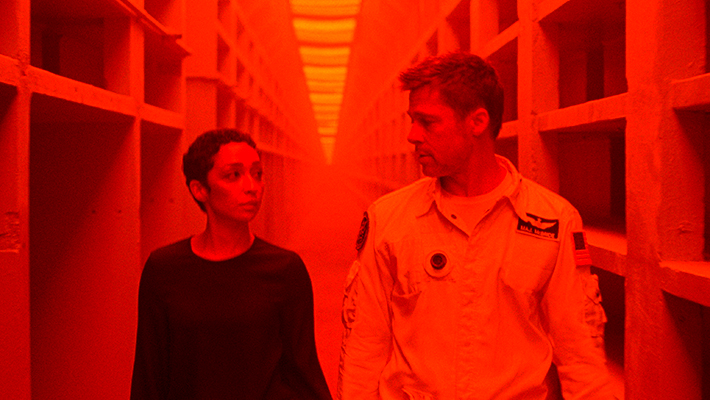It's been a while since I opened blogger for any reason other than deleting spam comments, but I've just come out of Ad Astra and I need to talk about it. No... I need to write about it.
I blame grad school and film class for this.
I love a good sci-fi movie as much as the next nerd. I've seen every Star Wars film (that was released in my lifetime) in a theater, I've enjoyed plenty of Star Trek, I laughed and cried in The Martian, and I'm a sucker for time travel (except for The Time Traveler's Wife, that movie scarred me for life, please do not watch it, watch About Time instead). I would argue, however, that Ad Astra is not a sci-fi movie; it is a movie that uses sci-fi tropes to explore modern ideas of religion, mental health, and resource allocation.
Be warned, heavy spoilers lie beyond the jump.
At first glance, Ad Astra is just close-ups of Brad Pitt's face for 122 minutes. The main story is slow-paced and the background information is sparse. Liv Tyler has a major role even though you might not remember actually hearing her speak. Tommy Lee Jones is the second-billed character and he's in it for maybe 8 minutes; his character H. Clifford McBride says, in a video message that he knows that God is the one who is leading him in his mission to find intelligent life on other planets. Pitt, who plays his son Roy McBride never mentions God but encounters religious ritual and spirituality in others, particularly in some tragic dealings with fellow crew members (space is dangerous, after all). As they launch their lost crew member into the void of space, one says a prayer and another says an amen. Roy looks on in quiet contemplation.
Throughout most of the film, Roy must do psychological evaluations to prove that he can continue on in his top-secret mission to find his father. He can express rage, contentment, confusion, loneliness, and any number of emotions, so long as his heart rate stays low and he can wrap up the message by saying that he is fine. There's a lot to potentially unpack, but what struck me is the complete lack of human connection in these evaluations. All he has to do is sit in front of a screen for a few minutes and everyone thinks he's good to keep going.
While on a commercial flight to the moon, Roy barely notices the background announcement reminding passengers to stay in secure zones, as territorial struggles have turned much of the moon into a war zone. It's jarring when he arrives on the moon to walk through a cheaper version of Futurama's Luna Park. The message is repeated when he meets a lieutenant there who will drive him through some disputed land, and then the men encounter groups they call "pirates" out on the lunar surface, and a short chase scene not unlike Mad Max: Fury Road takes place. The pirates, whose faces go unseen, kill Roy's driver and run the car into a crater.
The film's climax is finally reached when Roy reaches Neptune's orbit, where the project his father left on 27 years prior is still going. He finds corpses floating in the outer areas of the ship; Roy's father Clifford is the last man alive, and by now we know that he killed them. He acknowledges their deaths without any evidence of guilt. They weren't strong enough, he complains. They wanted to go home. They couldn't hold out until we found life. Clifford insists life is out there, and he will find it. Roy listens to it all as he downloads his father's findings and prepares to blow the project to smithereens. In his quixotic quest, Clifford has not noticed that he has been causing power surges that work their way to Earth and have been doing untold damage for months.
Roy embodies a certain disconnected agnosticism through it all, a contrast to his father's obsession with finding intelligent life. The encounter on the moon, a run-in with a raging baboon on a spaceship, and finding his God-fearing father whose passion for completing his religious duty overcame his duty to keep his fellow crew members alive all teach Roy that humanity might be the problem. Finding life elsewhere isn't going to solve any issues if we can't figure out how to share the few resources we have here, now.
After seeing the information that Clifford gathered while in orbit around Neptune, Roy realizes that his father's fixation on finding life had blinded him. His goal, his obsession with "what God wanted," became a mania that kept him from seeing other opportunities, other beauty1. Roy observes that in the images his father collected of places beyond our solar system, there is "no love or hate"; these are human creations that the farther reaches of space were still free of.
Roy's only apparent belief at the beginning of the film is that he doesn't need anything or anyone, just the current mission, but this belief is undone. He knows that he needs someone to love and lean on. Finding and letting go of his casually extremist father helps him see that the computer screen is not enough to process the burdens he carries.
The big moral of the story though, really, is that humanity needs to sort its shit out before we bother trying to bring our problems to everyone else.
Go see Ad Astra. 8/10.
__________________________________
1. Take note, Dallin H. Oaks.

